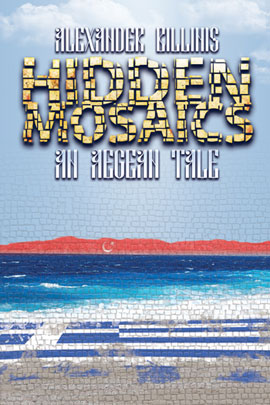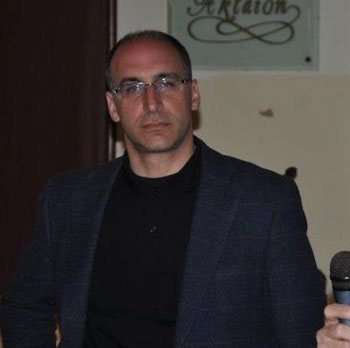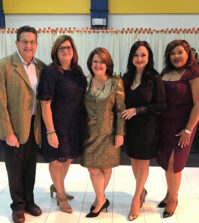A Greek and a Turk discover they look alike in HIDDEN MOSAICS: AN AEGEAN TALE by Alexander Billinis

HIDDEN MOSAICS: AN AEGEAN TALE by Alexander Billinis
Like the protagonists of his debut novel, life has been an Aegean odyssey and migration for author Alexander Billinis himself. With a lifelong interest in the region, he’s lived and worked in Bulgaria, Greece, and Serbia, traveled extensively in Turkey, Italy, Austria, and Hungary, and currently live in Chicago with his Serbian-American wife and their two young children. “Serbia is a Byzantine successor state, like Greece,” he says. “To know your own country, you need to know your neighbors.”
A native of Salt Lake City, Utah, Billinis is a graduate of Georgetown University’s School of Foreign Service, with a major in East European Studies and advanced degrees in business and law. He worked as an international banker for a dozen years before the lure of history became his full-time pursuit and he has written extensively from abroad (also for NEO Magazine). His first book, The Eagle Has Two Faces, described his journey through the regions of the former Byzantine Empire with its double-sided view to East and West. His current book, Hidden Mosaics: An AegeanTale, is a novel about a Greek and Turk and their double-sided view. “A chance meeting between a Greek and a Turk, who look exactly alike,” he describes it. With something of his own duality? “In fact, my paternal line has a Muslim ancestor who converted after the Greek War of Independence. And I met a Cretan Muslim in Izmir who heard me speaking Greek with other tourists, and spoke to us in a Cretan Greek dialect vaguely reminding me of the Greek spoken by Cretan old-timers in my Salt Lake City, Utah, hometown.”
Why a novel and what is the book about?
My previous book was non-fiction, a travelogue. For this book, I liked the ability to make things up in fiction, though I drew from fact, experience, and history, because as they say, “truth is [usually] stranger than fiction.” The book’s setting is in the Aegean of today, in Turkey and in Greece. A chance meeting between a Greek and a Turk, who look exactly alike. The Turkish protagonist, Osman, just cannot believe this is coincidental, and sets off on a study of his personal and family history, in Turkey, and in Greece. The economic problems in Greece, the growing divide between secular and Islamist Turks, and of course the past history or wars, massacres, expulsions, all figure prominently in the book.
What inspired it?
The book has been in me for a long time. It started when we lived in Greece, and the human and architectural legacy of the 1920s population exchange was everywhere. We visited Istanbul, and in Hagia Sophia, we saw the most beautiful mosaics, which had been plastered over by the Turks for several hundred years, exposed by American art historians after Hagia Sophia became a museum. I told my wife, “look, the truth comes out.” I also took a trip with my best friend to Izmir in 2011, and the spectral presence of Greeks was everywhere. I spoke about this in Neo Magazine, “The Ghosts of Smyrna in Izmir,” (January 2013).

Alexander Billinis
Any autobiographical elements?
The book is full of autobiographical elements. My paternal line has a Muslim ancestor who converted after the Greek War of Independence. I covered this in Neo Magazine, “Unofficial Histories, 1821,” (April 2014), and I met a Cretan Muslim in Izmir who heard me speaking Greek with other tourists, and spoke to us in a Cretan Greek dialect vaguely reminding me of the Greek spoken by Cretan old-timers in my Salt Lake City, Utah, hometown. This fellow, who somewhat resembled me in appearance, was the inspiration for Osman. Both the Greek and Turkish protagonists contain elements of my personality. Other key characters are, further, not entirely fictional, and several of the surnames in the story (Meimetis, Billinis) are from my own family. I struggled with whether to use these names, but they are part of my identity, and I wish to honor them. My paternal grandfather’s family was aware of this Muslim convert in their ancestry, and it is far less uncommon than official Greek history would have you believe. Also, my paternal grandfather after whom, in timeless Greek fashion, I am named, perished in the Battle of the Atlantic, in 1942. I of course never met him, and I wanted to give that man’s legacy a voice.
How did you research it?
Well, I was fortunate to have lived and worked in Greece, and to travel and understand the main Greek geographies in the novel (Athens, Neapolis, Western Macedonia). Aspects of life in Greece were therefore familiar to me and needed only supplemental research when it came to the Revolutionary Era, the Greek-Turkish War and Population Exchange, and the Civil War. Events in Cyprus also figure centrally in the story. Turkey was more difficult. I read prolifically on Turkish history, but as I only had visited the country twice, some aspects of the culture and lifestyle I either deduced, or relied on the assistance of my many Turkish friends, or foreigners resident in Turkey.
Why these particular protagonists?
Well, here we are back in the autobiographical discussion. Osman, in particular, reminds me of myself. Brooding, historically-oriented, romantic, with a more practical yet thoughtful wife. He is struggling with the prevailing economic and political culture. It reminded me in my own career, particularly in Greece. Of course, Osman is different than me because he lives in a Muslim country but he is very secular, and Turkey is becoming more and more Islamic. This prompts Osman, who, like me, was American educated, with thoughts of taking his family abroad. His struggle was more in terms of identity and choosing what route to take for his life and family.
I also understand Yiannis, though my own socio-economics are different from his. The struggle of life in Greece, the inability to make a decent living, and the constant question, “to leave the country or not?” These are timeless questions that have burdened Greeks for centuries, and we in America are the results of generations of an affirmative answer to the migration question. Yiannis is less bothered with the more esoteric questions of identity than Osman (or me) because he is dealing with existential financial ones. When Osman comes to Greece and they walk through their common history, Yiannis’s official, rote-learned versions of Greek history are dismantled.
Any revelations about the history in the course of researching or writing the book?
Not really, I was aware that what is taught in official history anywhere is not really actual history. The historical record is easily edited to suit political and ethnic agendas. Osman is quick to admire the transparency of American history and culture, which he studied in New England and Washington DC, but a Greek professor he met in Athens reminded him that this same America basically committed genocide against an entire native population. In our American schools the portrayal of this act has undergone deconstruction over the decades. Andrew Jackson was still a great American hero when I went to school, and the “Trail of Tears” was a postscript.
The difference is, in Greece and Turkey, historical deconstruction barely exists. I am sure the book will offend many Greeks and Turks. I already have been “unfriended” by some for my offensive research questions.
Any surprises about your own history in the course of writing the book?
I was fortunate that I had uncovered most of the surprises in my own history well before writing this book. In this, I had assistance from several people in my extended family, in particular Antonis Kourkoulis, a distant cousin for whom I have great admiration. He showed me my great great great grandfather’s baptismal registration, found in the Greek State Archives. See my article in Neo Magazine (April 2014). The book itself is about these surprises, the mosaic that lies beneath the “plaster” of the Blue and White of the Greek Flag, or the Turkish Red and White. I guess I always knew that geography, and the shared history—even if antagonistic—of hundreds of years meant that there was a common mosaic underneath. Let’s face it, the Aegean/Balkan region has usually been part of one cultural, political, and economic entity—from the Greco-Roman, Byzantine, and Ottoman eras. How can there not be a mosaic beneath, and barbed wire and official flags of Greece, Turkey, Bulgaria, Albania, etc, is not going to change that in only one century.

Izmir (Smyrna) from Asensor, where the book begins
Why the lifelong interest in the mosaic of these regions?
Because this is who I am. Who we all are. In my book dedication, I dedicate this, my second book, to my wife, “who showed me the mosaic.” She is from Vojvodina Province in Serbia, where we lived for 3 years. Over 24 nationalities live there, it is a true ethnic mosaic. My wife is typical, Serbian Orthodox with Serbian, Croatian, Hungarian, and possibly some German or Jewish ancestry. They realize there is a mosaic, and acknowledge it openly. Further south in Serbia, and certainly in Greece or Turkey, the mosaic is there, just not discussed.
What is your family background and how did a kid from (where in the States?) get interested in these regions?
Well, it is not unusual for the American-born generation to be interested in their roots. I was fortunate to be able to travel to Greece as a child nearly every summer, so I had an exposure to Greece over many years, but I always had trouble with the official “Greek school-Greek church” version of history—glorification of the Ancients, a basic jump over nearly two millennia of history, to the 1821 Revolution, also deified, to Greece of today. I knew that those two millennia made Greece what she is, and I also knew that our neighbors were part of that history. Only after travel to the neighboring countries, however, did I realize just how interconnected we are with our larger neighborhood.
Did the career (in international banking) get you interested in this history or did the history attract you to an international career?
The interest in history came first. A career in international banking helped to pay for the interest in history, and travels abroad. My career also found me a job in Greece, and then in London. Banking junkets took me to Istanbul, to Bucharest, Amsterdam, London, Warsaw, and elsewhere, where, when the business was done, I could pull out a pen and paper and write. If I am honest, I would steal minutes on my wordpad on my computer all of the time. Also, in Greece, though working there was dismal, sometimes, in meetings, the talk would turn to history and politics. That was more interesting than the business at hand.
How did you balance your day job (in banking) with your passion in history?
I probably didn’t. I am no longer a banker. My boss in Greece said, “When you speak of your weekend trips, of writing and history, to Mystra, to Monemvasia, your eyes light up.” Smart guy.
How did you decide to live abroad?
It was always an interest. I studied abroad twice, in Belgium and in Hungary. I worked in Chile and Bulgaria. I studied German in Germany. When I was offered a job in Greece, I just could not refuse it, even though I suspected that the “Greek Reality” would be something I would grow to despise. After Greece, we went to Britain, and after Britain, to Serbia, so the desire to live abroad did not fade for a long time.
What is your perspective from abroad?
Being abroad, living the life of a local in Greece, complete with the bureaucracy, the citizenship, the military service, et cetera, completed me. The time we spent in Britain and Serbia also broadened my experience. I will always be a European, but it solidified my identity—my primary identity, as an American. Not an Ethnic American, but an American. Before we went to Europe, I saw everything through a Greek-American prism, now I see things from multiple perspectives.
Why Serbia?
Serbia is a Byzantine successor state, like Greece. To know your own country, you need to know your neighbors. It is a fascinating place, not well known, and utterly misunderstood, yet, for a Greek, hauntingly familiar and very welcoming. I found so much Byzantine and Greek history in Serbia, some of which I write about in Neo Magazine. Bulgaria, too, where I worked for a summer, is so familiar, even more than Serbia. Turkey is also familiar, and that comes through in the book, the similarities on both sides of the Aegean. I constantly use terms in the book, words, that are common to Greece, Turkey, or Bulgaria or Serbia. So much history has been shared.
Have the borders of the Balkans gelled or will they be forever fluid–now especially with new migrations?
Neither the borders nor the countries have gelled. They are too diverse, and their institutions too weak. And this includes Greece, in every sense of the word. These migrations—they were after my time in Europe, but the porousness of borders were already present. We lived near the Serbian-Hungarian border, and in one of the main crossing towns, Subotica, Arab people smugglers were establishing themselves in 2011 or so, well before today’s deluge of refugees. All of these countries are in dire economic and political condition, and it is entirely possible that, particularly as winter comes, that the refugee flood will thaw several frozen conflicts. I spoke to a journalist friend of mine, about a year ago, a brilliant Anglo-Greek based in Istanbul, that the story of the Arab migration was going to move to the Serbian-Hungarian border. It did, I don’t know how I knew, but I did. It is what happens when you “walk the ground.”
That is actually key. My late uncle, Sam Souvall, was a brilliant man. He was a savvy real estate investor and at once a keen intellect. He always said, “Walk the ground,” before purchasing real estate. We have been fortunate to “walk those grounds,” where the feet feel the mosaic below. “The land never forgets its children,” one wise elderly Serb told me. In walking the land, you feel its history.
Will the historical “stigma” of Greek culture and faith in these lands ever be assuaged by the fluid borders of social media and the Internet?
In my opinion, no. One thing I realized, when I did my brief service in the Greek Army, is that culture is deep, almost osmotic. In the Balkans, while this wave of refugees is deeply unsettling, it is not unprecedented. People are used to migrating within themselves, and the decade old phenomenon of social media will not change socialization of generations, of school, and of the army, “the school of the nation.” Problem is, these institutions generally plaster over the mosaics below, whether of thought or identity, and are the antithesis of transparency. If you are not for transparency, the book will upset you.
What is your next project?
Well, my first priority, like it is for everyone else, is to pay the bills and to care for my family. When I do have time, however, I would like to write about America. We often disparage America’s lack of culture or its uniformity. Nothing could be further from the truth. We are the ultimate mosaic. A couple of days ago, I was off work, and I traveled from our home, a two flat on the Northside of Chicago, through the ex-Greek Lincoln Square neighborhood, through Hispanic, Arab, Indian, African neighborhoods, to Yankee-settled Evanston, past Northwestern University, through Winnetka, heavily Jewish Glencoe, and then west through some of Chicago’s finest suburbs, corporate complexes to pharma giants, to semi-rural, almost Kentucky-ish Fox Lake, where we are renovating a lakeside cottage in a community that was once a magnet for Chicagoans fleeing the summer heat. A story could be told about that, given the desire.















0 comments